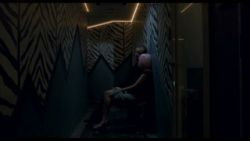Lost in Translation
Fan Site
| - Bob: I don't want to leave... | - Charlotte: So don't! Stay here with me. We'll start a jazz band... |
eFilmCritic.com Review
|
Sofia Coppola's 'Lost in Translation' is a wee, lovely piece about disenchantment giving way to enchantment. This director's touch is exquisitely gentle -- so much so that some viewers will inevitably complain that "nothing happens." |

I wasn't a huge fan of Coppola's only previous directorial effort, 2000's The Virgin Suicides, though I acknowledged that she certainly showed talent, if not a rigorous eye for material (the same is true of her brother Roman, who made the fetching but problematic CQ). Working this time with her own story, Coppola lets it relax and breathe, devoting herself to moods and moments. The only comparison I'll make here to her legendary father Francis is that this is the sort of small, intimate movie he himself has said he's always wanted to make. For whatever reasons, he hasn't. His daughter has. |
|
She's also done something else: American acting very likely won't get any finer this year than Bill Murray as washed-up movie star Bob Harris, who slouches towards Japan to do a whiskey ad campaign that promises $2 million. This is a performance to shelve alongside Murray's work in Scrooged, Groundhog Day, and Rushmore. Without any flashy dialogue (Coppola keeps it spare and realistic), with a bare minimum of movement, Murray damn near writes the great American novel. Take his karaoke scene. Now, we know very well that Murray, via Nick the Lounge Singer on Saturday Night Live, can destroy songs with the funniest of them. Here, as melancholy Bob, he covers first Elvis Costello and then Roxy Music; his rendition of "More Than This" certainly isn't the prettiest I've ever heard, but he makes you feel why Bob picked the song, what he sees in it, why it defines him. And the song becomes a heartbreaker. |

Drifting around the hotel bar when he's not suffering the inexplicable commands of his Japanese director ("More intensity," the translator explains unhelpfully -- leaving us, and Bob, to wonder how exactly one might turn one's head and sip whiskey intensely), Bob catches the eye of a similarly dissatisfied American -- Charlotte (Scarlett Johansson), the young wife of a photographer (Giovanni Ribisi) who's in Tokyo to shoot a band. Both Bob and Charlotte feel adrift in the teeming neon playpen of Tokyo, sitting alone in their respective hotel rooms and wondering why they're here -- in Tokyo and in general. |
|
Bob has a wife and children at home; exciting decisions await him there, such as what color the new carpet should be (burgundy? What is burgundy, anyway?). Each is noticed by the other without knowing it, and when they meet their rapport is easy and immediate. Romance is not an issue, nor is sexual tension; it's not a father-daughter-type relationship, either. They are two people of almost the same temperament and level of depression, and they reach out to each other instinctually and with relief. The husky-voiced, full-lipped Scarlett Johansson has an awkward, unfinished beauty, much like her director, and she makes something tentatively erotic out of her scenes with Murray even though the scenes have no sexual text or subtext. It's what I would call, for want of a much better term, platonic eroticism -- the friction of moods and minds sparking together. |

Coppola builds an entire movie on delicate exchanges, never goes for anything you expect (there's no stupid scene in which Charlotte's enraged, jealous husband decks Bob -- the husband is too preoccupied with his assignment to notice his wife's ennui), and leaves a lot of questions teasingly unanswered except between the lines. I wondered, for instance, whether Charlotte even knew who Bob was, or knew and chose not to let on; this is answered late in the game when a hurt Charlotte lashes out at Bob. |
|
And there's that much-debated whisper at the end, when Bob tells Charlotte something she hears and we don't. The more literal-minded viewer may speculate -- pointlessly -- about what is said, but by then, Coppola and the actors have made Bob and Charlotte so real to us that I simply didn't feel it was any of my business what Bob whispered. We've been privy to their shared happiness and despair for two hours, but their last exchange stays between them, as it should. |
By Rob Gonsalves |
Now Playing






















